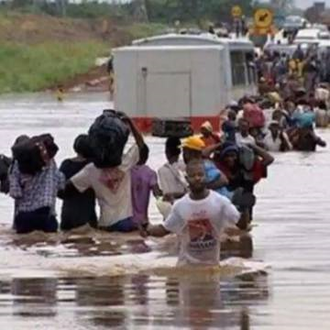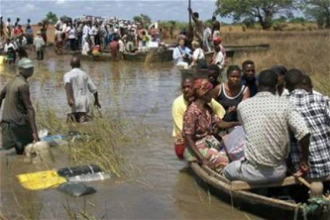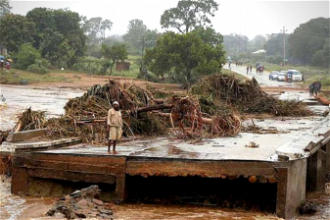Cyclone Idai: Call for ecological conversion

Disasters such as Cyclone Idai "need not awaken only our sympathy towards humanity, but also our sympathy towards our planet, to God's creation itself," says Fr Agbonkhianmeghe E. Orobator, S.J., the Nigerian President of the Jesuit Conference of Africa and Madagascar. He was speaking in a statement addressing the devastating impact of Idai in Mozambique, Zimbabwe, and Malawi.
In the statement, Fr Orobator not only called attention to the significant humanitarian efforts being supported by the Jesuits and larger Catholic Church but also explicitly described the interrelationship between climate change and the growing intensity of major weather events. He noted that the economically poor bear the brunt of these weather events and called for an "ecological conversion," citing the call of Pope Francis's encyclical, Laudato Si', to respond to the realities of climate change.
Tropical Cyclone Idai is regarded as one of the worst tropical cyclones on record to affect Africa and the Southern Hemisphere and has caused catastrophic damage. The death toll is estimated to be upwards of 1,000 people, with hundreds more missing and thousands injured. Experts have described its destruction as some of the worst ever seen in the region.
The full statement from Fr Orobator, which was published by the Jesuit Conference of Africa and Madagascar on 25 March 2019 can be found below.
Statement by the President of the Jesuit Conference of Africa and Madagascar on Cyclone Idai
My thoughts are with the hundreds of thousands in Mozambique, Zimbabwe, and Malawi who have been affected by Cyclone Idai over the past week. The devastation this storm has caused deserves the attention and support of the international community to rebuild. I'm encouraged by the level of humanitarian assistance to the affected countries.
The Jesuits in Africa and Madagascar join the rest of Africa and the world in mourning the loss, interruption and destruction of lives and livelihoods caused by Cyclone Idai. The scale of devastation it caused is enormous. 90% of the city of Beira is reported to have been destroyed, floods have wiped out entire villages, key infrastructure such as roads, hospitals, schools, have been destroyed; one, St. Charles Lwanga Catholic School in Chimanimani in Zimbabwe, was buried by a mudslide, causing the deaths of some students. The devastation has made the affected areas difficult to access, hampering aid efforts by individuals and organisations. The scale of the destruction can thus only be fully ascertained later once these communities are accessible.
The real devastation, however, is the lives that have been lost. As of 22 March, the death toll is reported to have surpassed 500 across the three countries. This number is expected to rise as water recedes and more bodies are discovered and retrieved. The Cyclone has affected about 1.7 million people in the three countries, who stand in need of humanitarian aid.
We are in close solidarity with the communities that have been affected. The Jesuits in Zimbabwe, Mozambique, South Africa, Zambia and Malawi have already initiated campaigns and appeals to raise resources needed to bring relief to these communities. The Jesuit Relief Fund of the Zimbabwe-Mozambique Province has already managed to send the first batch of aid they have gathered so far within Zimbabwe. This comprises clothes, non-perishable food and blankets. This has been sent to Chimanimani, the worst affected area in Zimbabwe, through the Catholic Commission for Justice and Peace (CCJP) of that area's diocese. More aid in cash and kind is still being gathered in Zimbabwe and South Africa and from further afar. It is encouraging that alumni of Jesuit schools within Zimbabwe who are based abroad have been forthcoming and supportive through offering cash donations. The response to the plight of the affected people, especially within Catholic circles, has been overwhelming. Such moments help us restore our faith in humanity.
However, disasters such as this one need not awaken only our sympathy towards humanity, but also our sympathy towards our planet, to God's creation itself. As humanity, we need to respond to the distress of our planet. Global increase in adverse and calamitous weather conditions is a manifestation of climate change, which we humans are largely responsible for. While the poor are the least responsible for global warming and environmental degradation, it is they who bear the brunt of its effects. Caring for our Home is the surest way of preventing the frequent occurrence of such disasters and of taming their severity.
Humanity needs to undergo an "ecological conversion", spoken of by Pope Francis in his encyclical on the environment, Laudato Si'. Let us especially use this time of Lent to help those in need in Mozambique, Zimbabwe, and Malawi in whatever means possible, as individuals, communities and organisations. Even the smallest of gestures can bring hope to those who have no reason to have any, given these circumstances.
God bless you all,
Fr Agbonkhianmeghe E. Orobator, S.J.
President of the Jesuit Conference of Africa and Madagascar


















